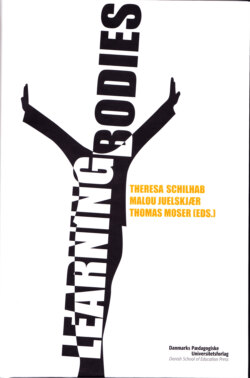Читать книгу Learning Bodies - Группа авторов - Страница 21
На сайте Литреса книга снята с продажи.
The imperative of body and reality
ОглавлениеDoes not the concept of interactional experts ridicule the idea of significant bodily constraints on cognition? Even if it certainly looks like it, the answer must be “no” (see also Schilhab 2007). Interactional experts are knowledgeable of the scientific discourse to an extent that makes them inseparable from the rest of the community if tested by their talent for intelligent conversation. Still, according to Collins, the vocabulary of interactional experts (Iv) is parasitic on contributory vocabulary (Cv). If the interactional vocabulary piggybacks on contributory discourse, it differs in a non-negligible fashion that might be at variance with Iv being inseparable from Cv.
First, Iv conversations will probably lack sufficient reference to real life situations as interactional experts by definition are less knowledgeable about real life application. The lack appears as a “mutated” form of creative thinking characterized by discernable detachment from reality. Interactional experts would relate to the scientific topic in the same way the young relate to life. Since they are still novices with respect to the ups and downs and regularities of life, they can (fortunately) have bold and ungovernable fantasies. They might have strong opinions on how to bring up children or how to combat harassment at work or the unfaithfulness of a spouse. Later in life, hands-on experience and learning the hard way regulate their ideas12. Only by living life do we systematically learn what will work and what will not.
Similarly Iv might diverge ever so slightly from Cv by disobeying rules invoked by reality. An objection to understanding Iv as more imaginative than Cv is that we did not take the piggybacking characterization at face value. One could counter that, if we did, we would have to accept that interactional experts are linguistic imitators; thus, they would not use conversational elements that had not already been sanctioned by the scientific community. They would have learned everything there is to say about the topic as well as how to talk about the topic by being exposed to and involved in conversations with contributory experts. Collins, for instance, compares the interactional expert to a spy visiting a strange town in which he attempts to behave like a native. Although he has never actually been to the place, he has studied all there is to be said explicitly about the city by talking to natives and adopting their linguistic expressions (Collins 2004, p. 129). Thus, piggybacking on contributory vocabularies and manners of speaking ensures a level of eloquence that makes Iv impossible to discern from Cv.
However, the counterargument is false, since interactional experts at the outset are thought to be linguistically inventive and not at all parrot-like. They are equal interlocutors, and that excludes simple mimicking. Otherwise, they would not be convincing in discourse, which among other things probes for match with reality. What we object to is the idea that everything that could be said about a topic has in fact been said by contributory experts and could therefore eventually be picked up by interactional experts. It is highly conceivable that interactional experts produce ideas (based on their purely linguistic competences) that follow the general linguistic expressions (rules?) of the scientific community but conflict with non-linguistic knowledge. Here, non-linguistic knowledge could be knowledge that has not yet been formulated but still informs every contributory expert. It is knowledge gained from practice but, for some reason, not yet formulated. In laser building, it could be the length of capacitor leads, which H did not notice at first in the source laboratory but nevertheless had some vague ideas about (Collins 1992, p. 61).
A related objection is that real life encounters may form pivots on which aspects of linguistic knowledge hinge. For instance, when contributory experts talk, they will refer to real life phenomena which they encounter during laboratory work. Notice, that contributory participants of the same discourse are also likely to refer to the same kind of real life experiences. In contrast, interactional experts, who lack the same experience, have different vocabulary references. When they use technical terms, these are defined purely in linguistic terms. In other words, the interactional language derives its meaning exclusively from other words. Although interactional language piggybacks on contributory discourse, it relates exclusively to rules of discourse (which words go with which words, etc.)13. In contrast, contributory language derives its meaning partly from how it refers to other words and partly from real referents (see also Schilhab 2007).
This may not seem persuasive with respect to the imperative of the body. If Iv is no different from Cv, who cares what their vocabularies actually refer to? Yet, this is exactly the point we want to make: Iv is different from Cv to a considerable extent. One difference has to do with memory. As contributory experts partly refer to reality and real life experiences, their linguistic memory has more pegs to cling to. In comparison, the linguistic memory of interactional experts only clings to other words and their interrelation. All else being equal, contributory conversation might be more flexible and thoughts might come more quickly to mind, especially from subtle cues. Substantiation of this hypothesis could be pursued by empirical research.
